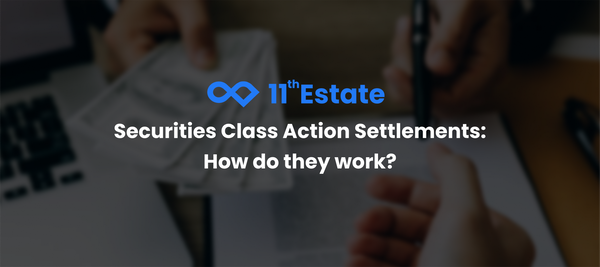Introduction.
A securities class action, or securities fraud class action, is a lawsuit brought by several investors who bought or sold a company's securities within a specific period, called a “class period," and suffered financial loss as a result of violations of the securities laws.
When companies violate the securities laws, it causes economic harm to many people at once, not just a single individual. A class action lawsuit allows a group of individual investors who have suffered similar harm to pursue their claims in a single action.
For a potential plaintiff, there are many valid considerations in favor of class action over individual lawsuit: legal costs are significantly reduced when shared between the class members; the case is stronger when there are many people behind it; if serving as a lead plaintiff, one can receive higher compensation than regular class members.
11thestate is a first-in-class social platform that provides a very convenient and practical tool for prospective class members and professional attorneys to participate in, facilitate and monitor potential securities class action Cases.
1. Statistics
A class action lawsuit is a useful instrument for getting your claim properly addressed. And although winning is not guaranteed, a statistic is in favor of the active approach. For example, during 1997-2020, an average of 228 federal class actions have been filed annually, with 218 suits filed in 2021. In 2021, aggregate settlements amounted to $1.8 billion, with an average settlement amount of $21 million. However, people are often unaware that they are eligible to join class action cases at no cost to them. And the likelihood of success is quite significant. Out of 239 class action cases resolved in 2021, 86 cases, or 36%, were settled by the defendants. (Cornerstone research)
2. Lack of awareness issue
Many highly publicized class action cases by investors that were hurt financially have addressed breaches of fiduciary duties and violations related to corporate governance. In plain language, it means that when investors in the company lose part of their investment because the company has been mismanaged, intentionally or by negligence, investors can recover their losses by going to court. However, in many instances where similar circumstances exist, stakeholders who suffer financial losses because of such violations, don’t take any action to defend their interests. In the US alone, with 6000 listed companies, less than 300 securities class action suits are filed annually, and that number could be many times higher, considering the circumstances.
Obviously, many investors are not aware of the opportunity to defend their rights, or they just do not wish to get involved in the very complicated and burdensome class action process. Even if an investor believes that their financial losses have been caused by the company’s actions, they may just not possess the necessary skills and free time to find out how to initiate a case, or where to look for an existing case to join. This information is not readily available to a layperson. And even if they are able to overcome the initial obstacles and obtain the basic information about lawsuit opportunities, they need to get an understanding of the corporate misdeeds, search for and negotiate with attorneys, maybe choose between several groups of existing plaintiffs, and face all these challenges at the obvious disadvantage of someone who has much less information that the other side.
With 11thestate Platform, you get one-point access to corporate information and competent analysis of significant corporate events that impact the value of your investment; you can communicate and coordinate with other investors in the same instruments; you can initiate and join class action lawsuits; you get to collectively select, on a competitive basis, an attorney to handle your class action; you will be able to monitor the progress of your case, and vote for important decisions on the case administration and settlement.
3. Types of Violations
To initiate a class action lawsuit, potential plaintiffs need a legal reason, which is called a cause of action. These are such violations of the securities laws as misstatements or omissions, manipulative or deceptive conduct, and false or misleading information contained in the offering of securities registered with the SEC under a registration statement. These corporate actions can take the following forms:
- Market Manipulation:
Any activity creating a false impression regarding the price, availability, or distribution of security
- Insider Trading:
Using internal information to gain profit
- Breach of Fiduciary duty:
Inability to act in the best interest of the beneficiary
- Churning
Excessive amounts of trading in order to boost turnover and brokers’ commissions
- Unauthorized trading
Trading against the wishes and interests of stockholder
- Malpractice or ineptitude
Unqualified person holds themselves out to be professional
-Fraud
Manipulation of financial statements
-Misconduct
Acting not in a prudent manner
Misrepresentation/Misleading
An untrue statement
11thestate Platform’s Scouts monitor and investigate negative changes in the value of stocks and financial instruments. These efforts support investors who wish to recover their financial losses by joining or initiating securities class action cases and consequently encourage public companies’ top management to put more emphasis on carrying out their responsibilities in the best interest of shareholders and other investors.
4. Legislation in different countries
Securities class action legislation is present in many countries around the world. Although specific legal practices may differ between jurisdictions, general principles are quite similar. A representative of the class of investors who suffered a loss on their investment brings them together and initiates a case in a court to protect their interests.
In the US, the securities industry is governed by several federal laws, such as the Securities Act of 1933, the Securities Exchange Act of 1934, and several other pieces of federal legislation. These laws govern the issuance and trading of securities and regulate the industry and the public companies. At the state level, matters related to the securities industry are regulated by the so-called blue-sky laws.
For procedural purposes, the most important piece of legislation for class action lawsuits is Rule 23 of the Federal Rules of Civil Procedure. It contains criteria and procedures for class certification by the court, which is necessary for the class action suit to proceed. These standards are further refined by the Private Securities Litigation Reform Act of 1995 (PSLRA) and the Class Action Fairness Act of 2005.
In the EU, legal treatment of class action matters has been finally unified for all member states after many years of discussions. EU Directive 2020/1828 on representative actions for the protection of the collective interests of consumers, came into force on 24 December 2020. EU member states have two years until 24 December 2022, to incorporate the directive into their respective legislations.
5. Practices in different countries
The US has the most developed class action practice, but in other countries, such as Canada, the UK, or the EU, the number of cases is also growing after changes have been made to their respective legislations, and more third-party funding opportunities are becoming available.
Potential plaintiffs who suffered a loss actionable within a class action suit have an important decision to make once they learn about their rights: whether to join the class action suit or to retain the right to file an individual lawsuit. Globally, there are two systems used in different countries. In the US, those who wish to bring individual lawsuits can opt out of the class action. In an opt-out system used in the US, Canada, and some other jurisdictions, qualified members are automatically included in and represented by the class until they expressly state that they do not wish to be. In an opt-in system, qualified members are required to express their wish to be represented by the class.
In the EU, Directive 2020/1828 which comes into effect on 24 December 2022, allows member states to use either system or a combination of both. It is up to member states to decide at which stage of the proceedings consumers need to exercise their right to either opt-in or opt out.
In the UK, the class action (mass action) system operated on an opt-in basis until 2015, when the opt-out opportunity was added. In 2021, the first case utilizing this opportunity was allowed to proceed by the Supreme Court.
Regardless of the specifics of national laws and practices, the 11thestate Platform, through its unified functionality, meets the needs of investors and lawyers from all over the world.
6. Participants and roles involved.
The participants of a class action suit include
· Class members(investors) who have similar claims against the defendant,
· Lead plaintiff who is appointed by the court and is responsible for the selection of and negotiation of the terms with the council, overseeing the class action and the council, participating in the trial and in the settlement negotiations, and approving the settlement,
· Attorney who is approved by the court and handles the case on behalf of the class members. In the US, attorneys provide their services on a contingency basis, without any upfront payment. They receive their fees and reimbursement of expenses only upon successful completion of a case through settlement or a court decision.
· Courts that certify the class of plaintiffs, approve the appointment of the lead plaintiffs, lead counsel, and then oversee the general progress of the case, discovery, settlement negotiations, fairness of the final settlement and of attorney’s fees, distribution of settlement funds, as well as adjudicate the matter in the rare instances when no settlement has been reached and the case goes to trial.
· Claims Administrator who handles various administrative aspects of a class action settlement. The Claims Administration service may be part of an accounting firm, or it may be a company that specializes in legal claims processing. Some of the administrative work that a Claims Administrator handles would include identifying class members and sending out notices of a proposed settlement to them; processing all requests to opt into (or out of) the settlement by class members; distributing settlement funds to class members, and ensuring appropriate tax is withheld and reported.
· Mediator who helps the parties come to an agreement on a settlement of the case. Mediation can take place after some pre-certification discovery and before class certification, and/or after class certification, and before summary judgment.
11thestate Platform is now also a participant of the industry and provides a very convenient and practical tool for prospective class members and professional attorneys to participate in, facilitate and monitor potential securities class actions Cases
7. Procedures within securities class action cases
When one or more members of the group (called the lead plaintiff(s)) bring a lawsuit against the defendant on behalf of the entire group, they must follow the 11 steps below:
1) Initiate a class action
2) Determine whether they have a cause for action. Potential plaintiffs need to decide if there exists a cause of action applicable to enough other people to create a class action. A class action generally applies when the legal claim is widespread, affecting many people, but may not be valuable enough to encourage everyone to file suit.
3) Find other possible plaintiffs. This can be done through Internet research or traditional news media.
4) Search for and find an attorney. It is best to seek law firms with experience in the kind of lawsuits like the one being planned, and certainly check their success record in the cases they handled and look for any problems these lawyers could have had.
5) Make a decision on filing a class action suit based on
o Possible value of the case if it’s won
o Ability of the defendant company to defend the case successfully, their case history
o Sufficient number of plaintiffs – currently at least 100
6) Make an informed decision on whether to become a lead plaintiff. A lead plaintiff is expected to take an active role in the case that could last several years, work closely with lawyers, attend key events, participate in key decisions, including settlement talks, and exercise their authority to approve a settlement. The lead plaintiff usually receives a higher percentage of the settlement than regular class members.
7) File a complaint that meets all prerequisites and other conditions for class certification.
8) Get the class certified by the court. There are many requirements for court certification. Initial criteria for certification include:
Numerosity means there are enough class members.
Commonality means that questions of law or fact are the same for to the class members.
Typicality means that class members’ claims are typical of the class.
Adequacy of representation means that class representatives must demonstrate that they will represent the interest of the class members fairly and adequately.
9) Get the court to appoint the class counsel
10) Notify all potential class members. According to FRCP 23, this notice must "clearly and concisely state in plain, easily understood language," certain key information, including the nature of the case (and the specific allegations against the defendant), the right to "opt-out" of the class, and the binding effect that any settlement or judgment will have on each member of the class.
11) Go through all necessary legal proceedings that lead to a settlement or a court decision
11thestate Platform is to enable and support the majority of these 11 steps.
8. Paperwork on all stages.
As for any competitive procedure regulated by the law, class action lawsuits must follow certain legal requirements. Some of those requirements relate to the documents that must be produced, provided to various parties, and exchanged between them at specific stages of the case. They are as follows:
· Lead plaintiff and their legal team to gather evidence to support their class action lawsuit – records, receipts, correspondence, etc.
· Attorney on behalf of the lead plaintiff files the complaint and the motion to certify the class in the court. It describes the financial damages that have been suffered, the facts of the case that show how the defendant’s actions harmed the plaintiffs, and define the class of plaintiffs who might later join the suit.
· The judge issues a court order certifying the class.
· The court appoints the class counsel (lead Attorney) and initiates the discovery process.
· During the court discovery process, the lead plaintiff gains access to the defendant’s records, including those that show the contact information of the potential plaintiffs.
· Lead plaintiff provides notice to potential class members through individual notices as well as various advertisement channels. The lead plaintiff keeps records of notices sent out and of written notices of those notified who chose to opt-out.
· For a complex case, the judge may issue a litigation plan.
11thestate Platform through its functionality facilitates all paperwork that is necessary for a Case and makes the process easier for all involved participants.
9. Selection of court and country/state jurisdiction.
In the US, class action lawsuits can be brought either in federal or state courts, sometimes in both (for example, in the Enron Corporation case). Individual states’ legislations differ between states. The rules that determine the choice of venue are rather complex and depend on many circumstances of a specific case. Federal courts are sometimes seen as more favorable for defendants; thus, many suits are initially filed with the state courts, with the defendants attempting to move them to the federal court. As a general rule, jurisdiction is determined by the state of residence of the plaintiff or the defendant’s business headquarters. With the latter, the plaintiff can even be a non-US resident.
The Class Action Fairness Act gives jurisdiction to the federal court system in any class action suit in which there are 100 or more plaintiffs, where any of the class of plaintiffs lives in a state different from any defendant, or the amount of damages sought exceeds $5 million.
Until recently, class action suits have been predominantly a US phenomenon. But with the changes in foreign countries’ legislations, mass claims are finding their way to courts in those countries. Also, dozens of class action suits continue to be filed annually in the US courts against non-US companies.
11thestate is a universe platform and is open for cases both in state and federal jurisdictions.
10. Settlements
Most class action lawsuits are resolved through a settlement before going to trial. A settlement between the plaintiffs and the defendant can be reached at any time. Of the 239 cases resolved in 2021, 153 were dismissed, and 86 were resolved through a settlement. During 1997-2021, less than 0.4% of cases reach trial, and less than 0.2 % were tried to a verdict. Settlement negotiations often begin after the suit is filed and are usually conducted through a mediator. Any settlement in a class action requires court approval. The court may deny the final approval of the proposed settlement if it concludes that the proposal is not "fair, reasonable, and adequate". After the settlement has been approved, the court at its discretion awards the attorney’s fees.
Any funds obtained for the class members are distributed following the court order. The administrative procedure for disbursing is usually included in the class action notice.
The lead plaintiff receives their percentage first. Then the attorneys who usually provide their services on a contingency basis, receive their legal fees and related costs. And finally, the remainder is divided among the class members.
Thanks to the functionality of the 11thestate Platform, you will be aware of all legal proceedings, including settlements.
11. Legal Fees
Generally, when you hire an attorney to handle your legal case, there are many types of fees that your attorney can charge during the case. These fees can take the form of a consultation fee, retainer fee, legal expenses, a flat rate for performing specific tasks, or an hourly rate. Normally, the fees are paid in advance or over the course of the case. The client and attorney typically sign a written agreement covering these fees in detail, with a fee schedule as a part of the agreement. So, when a client considers hiring an attorney, they should carefully plan their budget and know the maximum amount they can spend on a case, with the understanding that there is no guarantee of the desired outcome even if the entire budget is used up.
In a class action suit, however, attorneys usually provide their services on a contingency basis. This means that they get paid only if the case is won. The amount the attorneys receive is determined as a portion of the total sum that is recovered for the plaintiffs. Attorneys’ fees must be approved by the court at its sole discretion.
On the 11thestate Platform, Attorneys compete for the right to represent a Case, so final fees tend to be lower.
Conclusion
The class action process is long, full of obstacles, cumbersome, and emotional. As with any complicated project, a potential plaintiff would invest their time and effort into researching their prospects of recovering losses through class litigation, their legal standing in a potential or ongoing case, a search for a competent lawyer, interactions with other class members, and multiple other matters and problems that invariably arise along the way.
11thestate intends to make the process faster and simpler. You can join or initiate a case and then monitor and oversee your case as it proceeds without spending a lot of time and effort.









